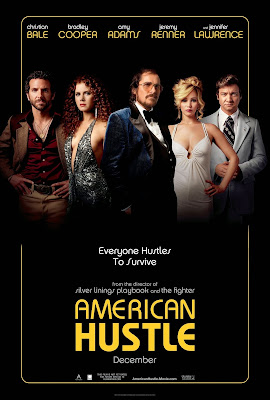Wacky hair, crazy wardrobes and
an even crazier cadre of performances. Writer-director David O. Russell strikes
gold once again with what is definitely his most ambitious film to date: American Hustle. Centered on the very real
Abscam scandal of the 70s and 80s, pretty much everything else in this movie is
most definitely fiction, but what entertaining and glorious fiction it is.
American Hustle simply has the
best cast you’re going to see in a single film all year; even the actors in
minor supporting roles are great. Actors Christian Bale, Jennifer Lawrence,
Bradley Cooper, and Amy Adams are all returning Russell collaborators and you
can clearly see why with this film. Russell is definitely an actor’s director
who values characters over narrative and the strength of the former and
weakness of the latter encapsulate the strengths and weaknesses of this film. This film is at its best when those
characters take center stage in numerous unpredictable and emotionally charged
scenes and at its worst when some rather uninteresting and drawn out plotlines are
delivered.
Unlike Irving Rosenfeld’s (Bale)
very elaborate and intricate comb-over (glue is an integral part of the process),
the set up here is pretty simple and straightforward. It’s the 1970s and it’s a
time of flashy excess and big characters with big dreams. Irving and Sydney (Adams) are con artists and
lovers who get caught in their scam by ambitious and slightly unhinged FBI agent
Richie DiMaso (Cooper). Richie sees them as his meal ticket to success and fame
and starts using them as bait to catch some bigger and much more dangerous
fish. This soon implicates politicians, mobsters, and congressmen but none of
it is enough for Richie. Irving and
Richie immediately clash in almost every way possible as Sydney also becomes a bone
of contention between the two men. And just to complicate matters further, we
find out that Irving has a secret family life with an exceedingly unstable wife
(Lawrence) and adopted son to deal with. It soon becomes clear that these are all
very self-destructive people descending further and further into chaos and
situations that are way above their heads. Aside from that, the details aren’t
that very important; throw in a corrupt mayor (Jeremy Renner with a ridiculous
pompadour) and a Hispanic guy posing as an Emirati Sheikh and you get the
picture. There’s lots going on here and it’s better to just sit back and enjoy
the ride.
American Hustle is a surprisingly
hilarious film with a plot that meanders up and
down along with the characters’ machinations and manipulations. But the thing
that this film does well is establish all of the characters’ varied and often contradicting
motivations. These are people that are as unscrupulous as you can get and they all
live in a moral grey area where the main imperative is to take care of yourself
and your own bottom line. Different things torment them. Crushed expectations
and unpleasant surroundings envelop and suffocate them; life has taken a
sizable toll. They all want to be someone else and aspire to be something else.
When Irving becomes enamored with Sydney, he sees a beautiful and sophisticated
woman who understands him and poses an opportunity to escape his unhappy
married life. She sees a confidence and largesse that is appealing but
ultimately illusory. Ambitious to a fault and lacking
the intelligence or the patience to pursue those ambitions successfully, Bradley
Cooper has a lot of fun with Richie and his manic misplaced energy is the
source of lots of the humor. As for
Jennifer Lawrence, she is the stay at home mom of your worst nightmares.
Whether she’s getting drunk or accidentally starting fires, Lawrence isn’t one
of the primary players but gets some of the biggest laughs. Comedian Louis CK also
shows up as Richie’s long suffering supervisor and the handful of scenes
between the two of them are comedy gold.
But the star of the show here is undoubtedly
Christian Bale (who goes through yet another one of his trademark physical transformations). Although he takes a backseat every now and then,
we’re mainly following Irving’s story and his attempts to find some
semblance of happiness in his crazy messed up life. The overweight and perennially stooping Irving clings to one thing
that he cares about most of all: his relationship with his adopted son Danny. Things do get muddled and confused at times to
the extent where you aren’t even sure what some of the characters want anymore
but that’s exactly the point. One of the subtexts this film addresses is the lies
you tell yourself and their power in controlling your life. Lies to get you up
in the morning, lies told to get the right thing done, and lies to make you feel
better about yourself. But these characters lie to themselves and each other so
frequently the line between truth and fiction becomes totally blurred. And it is
ultimately through finally finding some truth in their lives and truly caring
about someone besides themselves that the characters who do get happy endings
find their redemption.
Verdict: American Hustle is an entertaining
and well-acted film that contains more laughs in one scene than the entirety
(cough...The Hangover III...cough) of certain other “comedy” releases of 2013. Continuing
to build on David O. Russell’s success with Silver Linings Playbook and The
Fighter with yet another winner, this latest film might just be the best of the bunch.
B+
Trailer:
Movie info:
Runtime: 138 minutes
MPAA Rating: R
Cast: Christian Bale, Bradley Cooper, Amy Adams, Jennifer Lawrence
Director: David O. Russell
Screenplay: David O. Russell, Eric Singer
Cinematography: Linus Sandgren



















